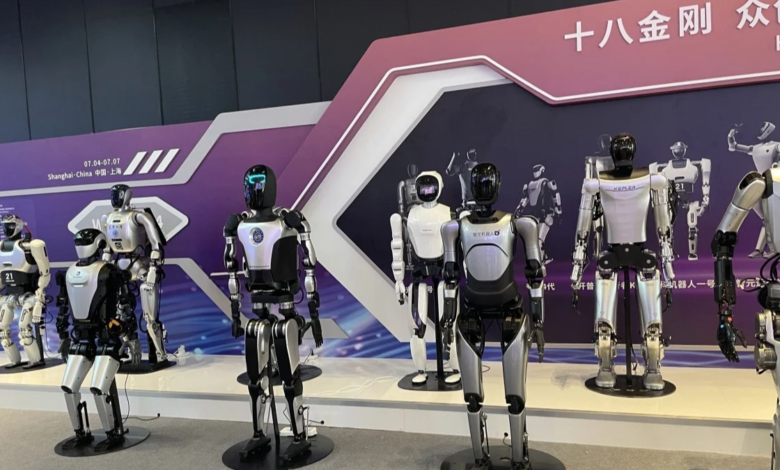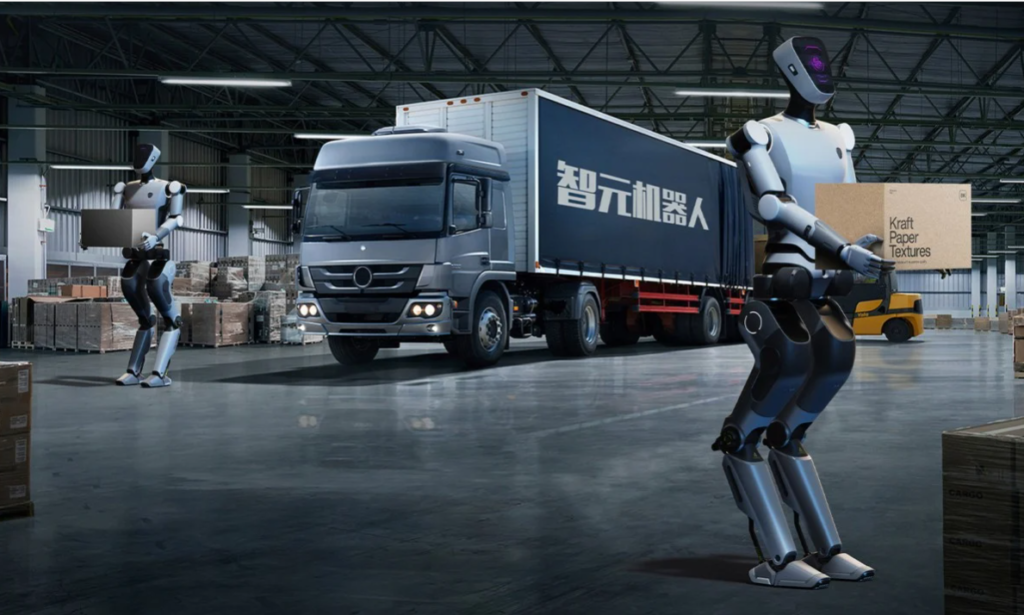
- In partnership with Growth School
Happy Wednesday, AI & Data Enthusiasts!
Competition between global superpowers heats up this week as Chinese startups unveil five new humanoid robots, outpacing Tesla’s Optimus. Surprisingly, these robots can perform delicate tasks like threading a needle. Meanwhile, the AI boom reveals tech giants’ sustainability failures with rising water usage. Stay tuned as we dive into these developments and more in our latest AI newsletter.
In today’s edition:
- Agibot Founder Launches Humanoid Robots to Compete with Tesla’s Optimus.
- Wyoming Mayoral Candidate Proposes AI Bot to Run Government.
- SleekFlow Secures $7M to Expand Conversational AI Across Asia.
- AI Boom Exposes Tech Giants’ Sustainability Failures Amid Soaring Water Usage.
– Naseema Perveen
WHAT CAUGHT OUR ATTENTION MOST
Agibot Founder Launches Humanoid Robots to Compete with Tesla’s Optimus

Peng Zhihui, a former Huawei “Genius Youth” recruit, has launched Agibot’s new-generation humanoid robots, directly challenging Tesla’s Optimus. Here are the key highlights:
- Agibot’s Launch: The Shanghai-based start-up unveiled five humanoid robot models, including the flagship Yuanzheng A2, which stands 175 cm tall and weighs 55 kg. These robots are designed for both household and industrial tasks.
- AI-Driven Capabilities: Equipped with advanced AI, the Yuanzheng A2 can see, hear, and process complex information, performing delicate tasks like threading a needle.
- Market Competition: Agibot plans to start shipping robots in October, targeting 300 units by year-end. The company believes its commercialization and cost-control abilities rival those of Tesla.
- Growing Market: The humanoid robot market in China is projected to exceed 20 billion yuan(US$2.8 billion) by 2026, reflecting a significant increase in interest and investment.
- Peng’s Vision: After leaving Huawei in 2022, Peng has attracted major investors, positioning Agibot as a leader in the robotics industry.
While Tesla’s Optimus 2 prototype has been out for months, Chinese startups, including AGIBOT, have rapidly advanced, unveiling five new humanoid robots in just a few days. This swift progress highlights the escalating competition between the two global superpowers, as they strive for dominance in AI and robotics, pushing the boundaries of innovation and setting the stage for significant technological breakthroughs.
KEEP YOUR EYE ON IT
Wyoming Mayoral Candidate Proposes AI Bot to Run Government
In a groundbreaking move, a Wyoming Mayoral candidate proposes an AI bot to run the government. The Mayor plans to let an AI bot, named Vic (Virtual Integrated Citizen), assist in governing the city. Victor Miller, the candidate, has customized ChatGPT to create Vic, proposing a “hybrid approach” where the AI bot would provide data-driven insights while Miller handles legal and practical execution.
This is the first time in U.S. political history that an AI bot has been integrated into a campaign in this way. While Miller has faced skepticism and legal scrutiny, his campaign emphasizes the potential of blending AI’s capabilities with human judgment to lead Cheyenne into the future. Despite challenges, including an attempt to bar Vic from the ballot, Miller remains committed to his vision, urging voters to consider “a new intelligence in town.”
- Unique Mayoral Campaign: Victor Miller, a candidate for mayor in Cheyenne, Wyoming, is proposing to let an AI bot named Vic (Virtual Integrated Citizen) assist in governing the city.
- Hybrid Approach: Miller envisions a partnership where the AI bot provides data-driven insights while he handles the legal and practical aspects of decision-making.
- Historic First: This marks the first time in U.S. political history that an AI bot has been integrated into a campaign, highlighting the growing role of AI in governance.
- Legal and Public Scrutiny: Miller’s campaign has faced skepticism and legal challenges, including attempts to keep Vic off the ballot, though Miller himself remains a valid candidate.
- Future-Focused Leadership: Miller is urging voters to embrace this innovative approach, promoting the idea of a “new intelligence in town” to lead Cheyenne into the future.
SleekFlow Secures $7M to Expand Conversational AI Across Asia

SleekFlow, a social commerce platform headquartered in Singapore and Hong Kong, has raised $7 millionin new funding to enhance its AI-powered customer engagement tools and expand further into Southeast Asia, the Middle East, and Europe. The startup is capitalizing on the rapid growth of social commerce, where platforms like WhatsApp, Instagram, and TikTok are increasingly used for marketing and sales.
Key Highlights:
- Funding and Expansion: The new investment will drive the development of SleekFlow’s AI capabilities and support its market penetration across key regions, including Southeast Asia, the Middle East, and Europe.
- Growth of Social Commerce: Social commerce in the Asia Pacific region is projected to surpass $894 million by 2028, with conversational AI playing a critical role in scaling customer service operations.
- Competitive Edge: SleekFlow distinguishes itself with features like omnichannel capabilities, marketing automation, and in-chat payment links, making it a formidable player in the crowded conversational AI space.
- Leadership and Growth: The startup recently appointed Gao Lei, a Silicon Valley veteran, as CTO, boosting its engineering efforts. SleekFlow’s annual recurring revenue (ARR) has surged to $8-9 million, with its customer base growing to over 5,000 globally.
With this new funding, SleekFlow is well-positioned to lead the conversational AI revolution in social commerce, delivering innovative solutions that cater to the unique needs of Asian markets and beyond.
AI Boom Exposes Tech Giants’ Sustainability Failures Amid Soaring Water Usage

Recent findings have revealed a concerning rise in water consumption by US tech giants, especially in areas already facing severe water scarcity. As companies like Microsoft, Google, and Amazon ramp up their AI operations, the demand for water to cool high-performing servers has surged, leading to the consumption of billions of liters of water in water-stressed regions.
- Rising Water Usage: In 2023, tech companies in Virginia’s ‘data center alley’ used over 7 billion liters of water. Microsoft reported that 42% of its global water usage came from areas with water stress, while Google cited that 15% of its water withdrawals occurred in regions of high water scarcity.
- Impact of AI: AI algorithms generate significantly more heat than traditional computing, requiring more water for cooling. For instance, a single 5-50 prompt conversation with ChatGPT consumes approximately 500ml of water.
- Environmental Concerns: While some companies, like Amazon, have pledged to be ‘water positive’ by 2030, environmentalists warn that the growing demand for AI infrastructure could exacerbate water scarcity issues.
The rapid growth of AI technology brings with it serious environmental challenges, particularly concerning water consumption, which need to be addressed to avoid further strain on our planet’s vital resources.
ICYMI
- The biggest US companies are extremely worried about AI risks.
- Microsoft announces the 2024 “AI Tour” event.
- JPMorgan rolls out AI assistant to tens of thousands of employees.
- Sakana AI says it has built the first “AI scientist.”
- Google challenges OpenAI’s technology with Gemini Live.
MONEY MATTERS
- The conversational AI industry is projected to reach $49.9 billion by 2030, up 24.9% from $13.2 billion in 2024.
- Over the next 3 to 5 years, Taiwan Semiconductor is expected to grow its earnings by 26% annually.
- Meta expects to spend $37 to $40 billion on AI in 2024.
- Over the last decade, the U.S. has made $335 billion in private investment into AI.
- The AI market size is expected to reach $184 billion by 2024.
LINKS WE’RE LOVIN’
✅ Podcast: Listen to How AI and RNA Tech is Transforming Drug Discovery.
✅Cheat sheet: Cheat sheet for Microservices Design Patterns.
✅Course: Fundamentals of Generative AI for Beginners by Curtis Evans.
✅Whitepaper: Learn how AI chatbots can benefit your business.
✅Watch: The Verge reviews Google’s New Pixel 9 Pro’s Camera.
SHARE THE NEWSLETTER & GET REWARDS

That’s all for now. And, thanks for staying with us. If you have specific feedback, please let us know by leaving a comment or emailing us. We are here to serve you!
Join 130k+ AI and Data enthusiasts by subscribing to our LinkedIn page.
Become a sponsor of our next newsletter and connect with industry leaders and innovators.



